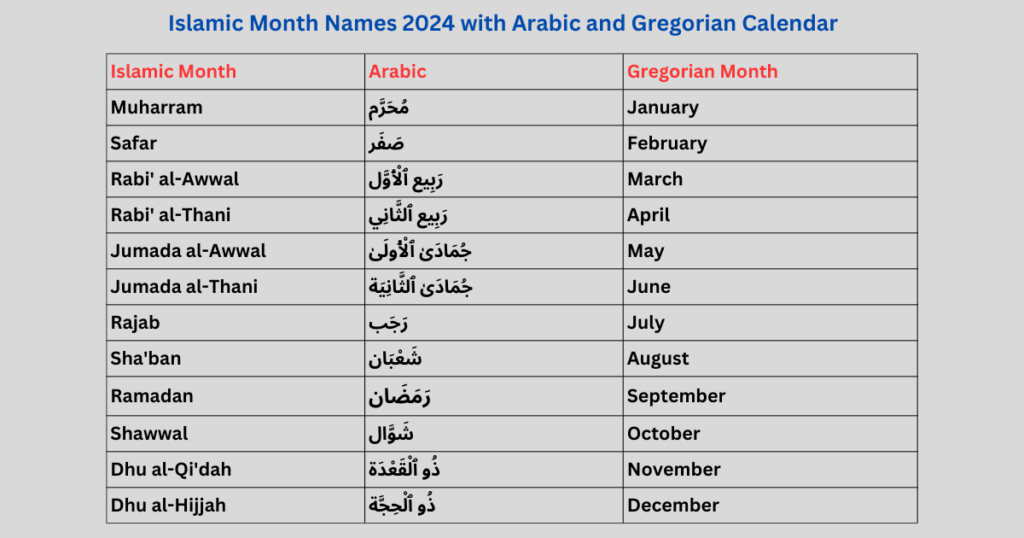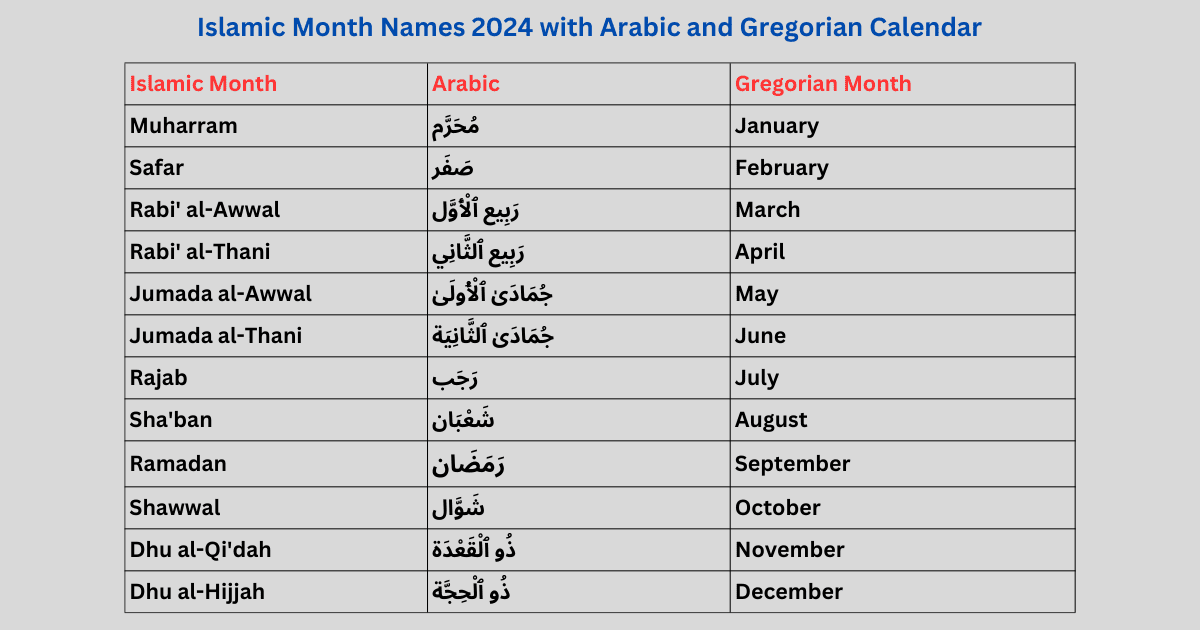Blog
12 islamic months, all islamic months name, islamic, islamic month name, islamic month name english, islamic month name in hindi, islamic month name urdu, islamic month names, islamic months, islamic months name, islamic months names, islamic months names in english, islamic months names in urdu, islamic months nasheed, months in islam, names of islamic months
pdfislamicdua
0 Comments
Islamic Month Names 2024 with Arabic and Gregorian Calendar
The Islamic calendar, also known as the Hijri calendar, differs from the widely used Gregorian calendar and comprises 12 lunar months. These Islamic month names hold deep significance within Islamic culture and tradition. Rooted in the Arabic language and Islamic heritage, they encapsulate various aspects of faith and history.
From Muḥarram, the first month, to Dhū al-Ḥijjah, the last, each name carries its unique resonance and importance. Understanding these Islamic month names not only enriches one’s knowledge of Islamic culture but also provides insight into the rhythm and spirituality of Muslim life.
Islamic Month Names 2024 with Arabic
Certainly! Here’s a table that includes both the Islamic months and the corresponding months in the Gregorian calendar:

Recent Posts
- Surah Maryam PDF with Para and Ayat Number
- 6 Duas for Protection of Family Wealth and Health
- Dua for Wisdom (Hikmah) in Arabic
- Dua for Control over the Tongue (Hifz al-Lisan) PDF
- 5 Powerful Duas for Peace and Tranquility
Islamic Month Names 2024 with Arabic
These are the twelve Islamic Month Names of the Islamic lunar calendar, along with January and February from the Gregorian calendar.
What are the Muslim months?-Meaning and definitions
1.Muharram
Muharram is the first month of the Islamic calendar, meaning “forbidden” in Arabic. It’s one of four sacred months, during which fighting is prohibited to ensure the safety of pilgrims returning from Hajj.
The most significant event in Muharram is the Day of Ashura on the 10th day, commemorating the martyrdom of Imam Hussein. It’s a time for reflection, mourning, and remembering the values of justice and courage in Islam.
2.SAFAR
Safar is the second month in the Islamic calendar, translating to “void” in Arabic. Its name carries two interpretations. Some suggest it refers to empty homes as people were out gathering food, while others believe it stems from tales of looting post-battle.
Several battles occurred during Safar, prompting Allah’s command for Muslims to move to Medina to prevent further conflict and uphold Islam’s peaceful principles.
3.RABI’ AL-AWAL
Rabi al-Awwal, the third month in the Islamic calendar, translates to “the first spring” or “to graze” in Arabic. It’s a joyous month symbolizing new life as cattle graze and the earth springs to life.
The most significant event in Rabi al-Awwal is the birth of Prophet Muhammad (PBUH) in 570 A.D. While Muslims celebrate his birth, they also mourn his passing, as he returned to Allah (SWT) during this month in 632 A.D.
Masjid me Dakhil Hone ki Dua Pdf-Download
4.RABI’ ATHANI
Rabi al-Thani, also known as Rabi’ al-Akhir or Rabi’ al-Sani, is indeed the fourth month in the Islamic lunar calendar, following Rabi al-Awwal. Its name translates to “the second spring” or “the second Rabi'” in Arabic, suggesting a continuation or repetition of the spring-like blessings associated with the previous month.
5.JUMADA AL-UWLA
Jumada al-Awwal is the Islamic Month Name translating to “the first patched land” in Arabic. Historically, it was believed to be the first month of summer before Islam. Some interpret its meaning as “to freeze,” suggesting frozen weather leads to patched land.
In Islamic tradition, the month of Jumada al-Awwal is not as extensively documented in Hadith literature compared to other months. However, there are general Hadiths that emphasize the importance of observing Islamic rituals and virtues throughout the year, including during Jumada al-Awwal.
6.Jumada al-Thani
Jumada al-Thani, the sixth month in the Islamic calendar, translates to “the last patched land” in Arabic. It holds significance for different sects of Muslims for various reasons.
Fatimah al-Zahra, the youngest daughter of Prophet Muhammad (PBUH) and Khadijah, was both born and passed away during this month. Additionally, Caliph Abu Bakr’s death occurred in Jumada al-Thani, making it a month of mourning for many believers.
7.Rajab
the seventh month of the Islamic calendar carries the meaning of “respect” or “honor” in Arabic. It is the second of the four sacred months during which fighting is prohibited, signifying its importance in Islamic tradition.
Rajab is considered as Allah’s (SWT) month, holding significant religious significance. It is believed that Rajab was designated as a sacred month to facilitate Muslims in completing the voluntary pilgrimage, Umrah, without fear of attack. Additionally, Rajab is known as Rajab al-Fard, meaning “alone,” as he stands out from the other three consecutive sacred months.
8.Sha’ban
The month of “Sha’ban” is the eighth month of the Islamic lunar calendar. Some suggest that its name may be derived from the Arabic word “shu’ba,” which means “branch.” According to this interpretation, the name reflects the practice of branching out during this month to search for water, a vital resource in desert regions
9.RAMADAN
The word “Ramadan” is derived from the Arabic root word “ramad,” which means scorching heat or dryness. It is believed that the name Ramadan means the burning away of sins through fasting and spiritual purification during this month.
10.Shawwal
The word “Shawwal” is derived from Arabic and refers to the tenth month of the Islamic lunar calendar. While there are various interpretations regarding its etymology, some suggest that it may be associated with the word “shala,” which means “when the female camel gets pregnant.”
According to this interpretation, the name was given because female camels were observed to become pregnant during this time of the year.
11.Dhu al-Qi’dah
The term “Dhu al-Qi’dah” is derived from Arabic and refers to the eleventh month of the Islamic lunar calendar. While its exact etymology is not universally agreed upon, some suggest it may be linked to the word “qa’ada,” meaning “to sit.”
This interpretation aligns with the historical significance of the month, as it was traditionally a time when warfare and fighting were forbidden. Additionally, people would pause their business activities to prepare for the Hajj (Pilgrimage), making it a sacred and contemplative time.
12.Dhul-Hijjah
“Dhul-Hijjah” is the twelfth and final month of the Islamic lunar calendar. Its name is derived from Arabic and translates to “the month of pilgrimage.” This month holds significant religious importance as it is during Dhul-Hijjah that the annual Hajj pilgrimage to Mecca takes place.
Dhul-Hijjah is also known for containing the days of Eid al-Adha, the Festival of Sacrifice, which commemorates the willingness of Prophet Ibrahim (Abraham) to sacrifice his sons as an act of obedience to God.
Muslims around the world celebrate Eid al-Adha by performing the ritual sacrifice of an animal and distributing the meat to the less fortunate. This month is considered highly auspicious and is marked by increased acts of worship, charity, and reflection among Muslims worldwide.














Post Comment